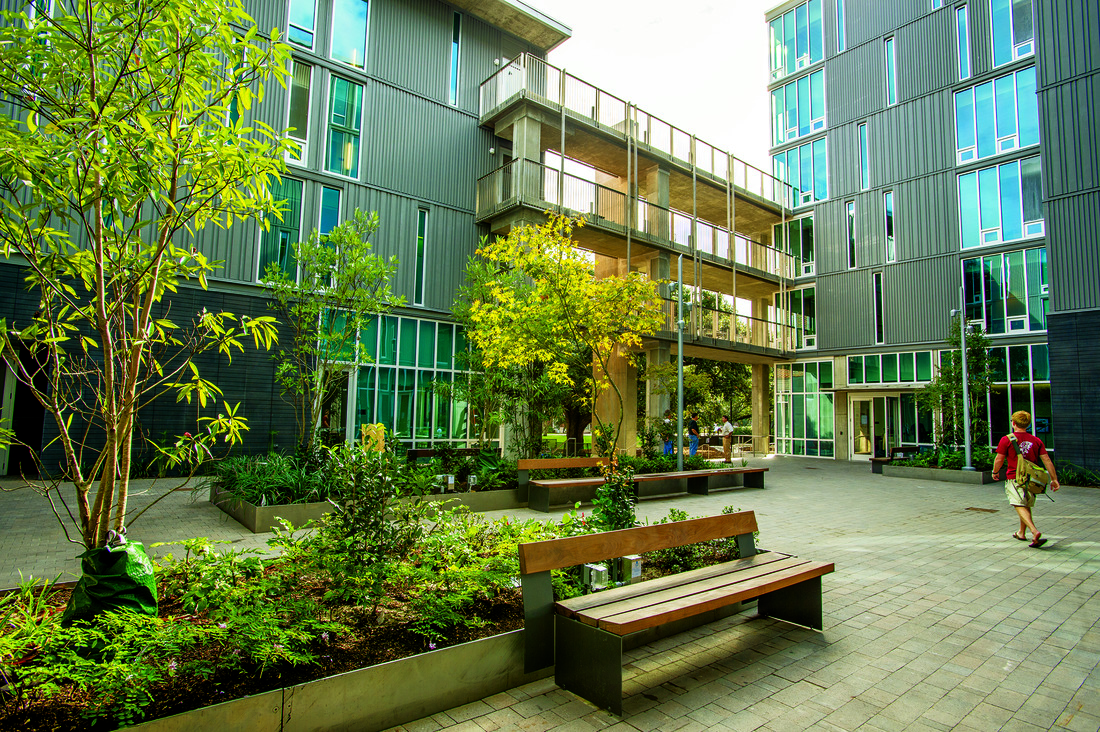Housing Accommodations
The Housing Accommodation Committee represents a collaborative effort between Housing & Residence Life, Campus Health, Dining Services, and the Goldman Center for Student Accessibility to provide a student-focused process that allows individuals to receive consideration for housing accommodations based on disability status and medical necessity.
The Housing Committee will explore all available campus-based resources when reviewing requests and determining accommodations. The committee prioritizes accommodating students' documented medical and/or disability-related needs over specific roommate and/or building requests.

Important Dates and Deadlines
To request housing accommodations, you must submit your documentation via the Goldman Center student application portal.
- If you're already approved for accommodations, you can apply for housing accommodations by submitting an "Additional Accommodation Request" through your Goldman Center student appplication portal.
PLEASE NOTE: The Goldman Center cannot approve "guaranteed housing" as an accommodation for Third and Fourth Year students.
For additional information on the housing process, see here: Returning Student Room Selection
| Deadline to submit an application: | |
| Fall Semester | January 16, 2026 |
| Fall Semester for SPRING SCHOLAR and TRANSFER students | February 14, 2026 |
| Spring Semester | October 1, 2026 |
Accepted students should submit their request for housing accommodations based on disability and/or medical need to the Goldman Center for Student Accessibility no later than May 1.
You can apply for academic accommodations at the same time as your housing request. PLEASE NOTE: Supporting documentation should contain recommendations for both the academic and housing environment - if applying for both.
| Deadline to submit an application: | |
| Fall Semester | May 1, 2026 |
| Spring Semester | October 1, 2026 |
The Housing Accommodations Committee is dedicated to ensuring that all students receive housing assignments that are consistent with their documented needs. However, the University may not be able to honor special housing accommodation requests received after the deadline, even if the Committee approves the corresponding student’s request.
**Adhering to the priority deadlines for housing accommodations is critical. Applications and requests received after the priority deadline will be considered on a rolling basis and accommodated depending on inventory.**
A Network of Resources
During the review of your housing accommodation application, you may be asked what campus resources you've already used to address your concerns. Please take time to explore and utilize the supports listed below, as the Housing Committee will prioritize campus-based solutions when considering your accommodation request.
Address maintenance needs, including appliance and air quality concerns, through Campus Services.
Housing & Residence Life has policies and procedures in place for supporting students in dorms, including room changes.
Seek treatment and management support for health concerns through on-campus medical services or through a referral.
College comes with transitional changes and developmental challenges. Seek support for new and existing mental health concerns on campus or through a referral.
Campus housing is not a distraction-reduced environment, but there are plenty of spaces to study across campus.
Tulane Public Safety offers support for campus safety, including safety escorts and crime prevention.
Tulane Hospitality offers support for students in need of dining plan modifications for a range of concerns.
Students can access support for eating and nutritional concerns through Campus Health.
Tulane's Wave of Support details resources available to students for a range of concerns across the domains of wellness.
Housing Application Overview
The Goldman Center for Student Accessibility is committed to ensuring that all students with diagnosed disabilities—especially those with chronic medical conditions or functional limitations—have equal access to on-campus housing. Our housing accommodation process is designed to identify and remove barriers in the residential environment so that every student can thrive. All housing accommodation requests must be submitted through our online portal. Requests submitted by email, phone, or through another Tulane office will not be considered. Incomplete applications or those missing proper documentation may experience delays in processing. Below is an overview of the steps in the housing accommodation process:
The Goldman Center for Student Accessibility supports students with diagnosed disabilities by ensuring equitable access to on-campus housing. To request housing accommodations, all materials must be submitted through the online portal—requests sent by email, phone, or other offices will not be reviewed.
Completed housing accommodation applications must include both the online request form and supporting medical documentation.
- If you’re new to the Goldman Center, submit a new application with documentation.
- If you already have approved accommodations, submit a housing request through the “Additional Accommodation Request” tab in your portal. If your current documentation does not include housing-related recommendations, please upload updated documentation.
Once you’ve submitted a complete housing accommodation application—including both the online request form and supporting medical documentation—your request will be added to our review queue.
If your application is complete, you’ll receive a Calendly link to schedule an Access Interview, a one-on-one consultation with a Goldman Center team member to discuss your housing needs and next steps.
Your access interview is a one-on-one meeting with a Goldman Center team member to discuss your housing accommodation request in detail. During this conversation, we’ll review your documentation, ask clarifying questions, listen to your personal experience, and explore available on-campus resources.
We’ll also outline the next steps in your application process. In some cases, you may be asked to provide supplemental documentation to support your request.
Following your Access Interview, your request will be reviewed by the Housing Committee, which meets on the first Friday of each month. Please note that University holidays or other operational changes may occasionally affect this schedule.
You will receive your determination via email no sooner than five business days after the Housing Committee meets.
Tulane University generally does not consider housing accommodations for the following:
- Requests related to attentional, executive functioning, or learning concerns — please refer to campus study spaces and academic support resources for assistance.
- Dorm-specific or building-change requests
- Roommate preferences or roommate conflicts — these should be addressed through Housing and Residence Life (HRL).
- Religious or spirituality-based housing requests
- Temporary or non-chronic health conditions (e.g., sinus infections, mononucleosis, etc.)
Tulane University follows the guidelines of the American Academy of Allergy, Asthma & Immunology in granting housing accommodations for environmental allergens. Students with housing accommodations due to environmental allergens will be permitted to purchase and bring allergen-proof fabric covers for bedding, a dehumidifier, and/or a HEPA filter air purifier.
NOTE: By engaging in the Housing Accommodation review process, you permit Committee members to share and discuss information about your medical condition and/or disability status strictly and specifically as it applies to your housing
The Goldman Center requires that students complete their request for accommodation AND provide current documentation before scheduling a meeting with the student. However, we are aware of potential barriers that exist in seeking current documentation necessary to move forward with your request. We work with each student on an individual level to navigate this process and discuss potential solutions and resources. If you have concerns about the documentation requirement, please feel free to contact the Goldman Center for further information and assistance.
In general, documentation should be written by a medical professional. Documentation must include comprehensive information on the diagnosis (including the DSM 5 or ICD-10 code), associated severity of the diagnosis, and the specific impact and resulting functional limitations of the diagnosis in the academic, housing, or dining environment. Common sources of documentation are health care providers, psychologists, and diagnosticians. The Goldman Center Fillable Provider Form can be used to submit information regarding your request. Important: While evaluators can submit recommendations for accommodations based upon their assessment, actual provision of accommodations is deferred to the appropriate board, school or occupational institution governing provision of accommodations under applicable law.
Suggested Documentation Elements:
- Typed on letterhead, dated, and signed by the qualified evaluator providing the documentation.
- Contains information on the diagnosed condition(s), including the DSM 5/ICD 10 codes
- Details the severity of the diagnosis, relevant symptoms, and associated impact in the academic and/or living environment
- If appropriate, discusses treatment, expected progression, and medication side-effects.
- Discusses current or past accommodations. It may discuss recommended accommodations.
Goldman Center Provider Form
Documentation Guidelines
Frequently Asked Questions
The University's priority is to support you, the accommodated student, over specific roommate requests. When possible, one (1) roommate may be moved with you before the START of room selection. Honoring roommate requests after room selection is not possible. Accommodating roommate groups (two or more roommates) is wholly not possible.
No. The Goldman Center works collaboratively with Housing to determine the specifications of the environment needed for equitable access, but does NOT assign specific dorm buildings or specific room requests.
The Goldman Center will not assign a new dorm building as an accommodation. For room/dorm changes, see HRL's Room Change process.
Tulane University has a host of on-campus study spaces across campus to support your learning needs outside of the classroom. As such, the University does not approve distraction reduced housing, nor is this a singular reason for being approved for off-campus living.
Tulane University Libraries Study Areas
Freeman School - Uptown Campus Study Spaces
No. The Goldman Center cannot fundamentally alter the requirements of the housing contract and housing expectations. We cannot mandate residency/adjust residency permissions beyond Housing's policies.
SoPA students cannot be granted housing until they are considered a student of Newcomb-Tulane College.
You still are required to formally request accommodation through the Goldman Center even if you have given Housing, or another campus department such as Case Management or Counseling, documentation or information requesting a housing accommodation.
Again, just to clarify: You MUST submit your accommodation request and supporting documentation to the Goldman Center to have any housing accommodation based on a disability/medical necessity processed. Once you submit an online application to the Goldman Center, you will also be required to have a Welcome Meeting/Consultation to discuss your request with a member of our team. Your request must then be processed through the Housing Committee.









